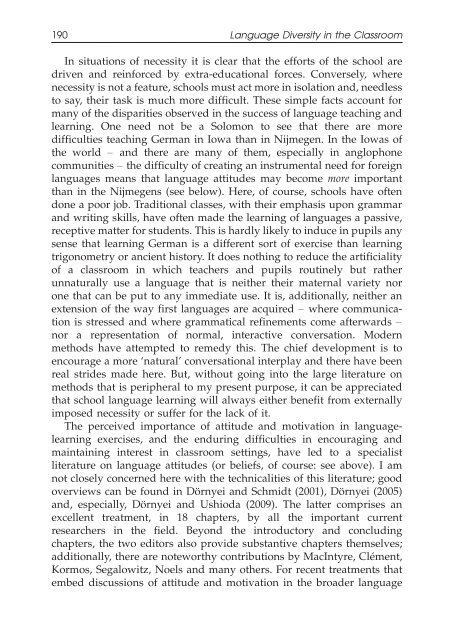Language Diversity in the Classroom - ymerleksi - home
Language Diversity in the Classroom - ymerleksi - home
Language Diversity in the Classroom - ymerleksi - home
- No tags were found...
Create successful ePaper yourself
Turn your PDF publications into a flip-book with our unique Google optimized e-Paper software.
190 <strong>Language</strong> <strong>Diversity</strong> <strong>in</strong> <strong>the</strong> <strong>Classroom</strong>In situations of necessity it is clear that <strong>the</strong> efforts of <strong>the</strong> school aredriven and re<strong>in</strong>forced by extra-educational forces. Conversely, wherenecessity is not a feature, schools must act more <strong>in</strong> isolation and, needlessto say, <strong>the</strong>ir task is much more difficult. These simple facts account formany of <strong>the</strong> disparities observed <strong>in</strong> <strong>the</strong> success of language teach<strong>in</strong>g andlearn<strong>in</strong>g. One need not be a Solomon to see that <strong>the</strong>re are moredifficulties teach<strong>in</strong>g German <strong>in</strong> Iowa than <strong>in</strong> Nijmegen. In <strong>the</strong> Iowas of<strong>the</strong> world and <strong>the</strong>re are many of <strong>the</strong>m, especially <strong>in</strong> anglophonecommunities <strong>the</strong> difficulty of creat<strong>in</strong>g an <strong>in</strong>strumental need for foreignlanguages means that language attitudes may become more importantthan <strong>in</strong> <strong>the</strong> Nijmegens (see below). Here, of course, schools have oftendone a poor job. Traditional classes, with <strong>the</strong>ir emphasis upon grammarand writ<strong>in</strong>g skills, have often made <strong>the</strong> learn<strong>in</strong>g of languages a passive,receptive matter for students. This is hardly likely to <strong>in</strong>duce <strong>in</strong> pupils anysense that learn<strong>in</strong>g German is a different sort of exercise than learn<strong>in</strong>gtrigonometry or ancient history. It does noth<strong>in</strong>g to reduce <strong>the</strong> artificialityof a classroom <strong>in</strong> which teachers and pupils rout<strong>in</strong>ely but ra<strong>the</strong>runnaturally use a language that is nei<strong>the</strong>r <strong>the</strong>ir maternal variety norone that can be put to any immediate use. It is, additionally, nei<strong>the</strong>r anextension of <strong>the</strong> way first languages are acquired where communicationis stressed and where grammatical ref<strong>in</strong>ements come afterwards nor a representation of normal, <strong>in</strong>teractive conversation. Modernmethods have attempted to remedy this. The chief development is toencourage a more ‘natural’ conversational <strong>in</strong>terplay and <strong>the</strong>re have beenreal strides made here. But, without go<strong>in</strong>g <strong>in</strong>to <strong>the</strong> large literature onmethods that is peripheral to my present purpose, it can be appreciatedthat school language learn<strong>in</strong>g will always ei<strong>the</strong>r benefit from externallyimposed necessity or suffer for <strong>the</strong> lack of it.The perceived importance of attitude and motivation <strong>in</strong> languagelearn<strong>in</strong>gexercises, and <strong>the</strong> endur<strong>in</strong>g difficulties <strong>in</strong> encourag<strong>in</strong>g andma<strong>in</strong>ta<strong>in</strong><strong>in</strong>g <strong>in</strong>terest <strong>in</strong> classroom sett<strong>in</strong>gs, have led to a specialistliterature on language attitudes (or beliefs, of course: see above). I amnot closely concerned here with <strong>the</strong> technicalities of this literature; goodoverviews can be found <strong>in</strong> Dörnyei and Schmidt (2001), Dörnyei (2005)and, especially, Dörnyei and Ushioda (2009). The latter comprises anexcellent treatment, <strong>in</strong> 18 chapters, by all <strong>the</strong> important currentresearchers <strong>in</strong> <strong>the</strong> field. Beyond <strong>the</strong> <strong>in</strong>troductory and conclud<strong>in</strong>gchapters, <strong>the</strong> two editors also provide substantive chapters <strong>the</strong>mselves;additionally, <strong>the</strong>re are noteworthy contributions by MacIntyre, Clément,Kormos, Segalowitz, Noels and many o<strong>the</strong>rs. For recent treatments thatembed discussions of attitude and motivation <strong>in</strong> <strong>the</strong> broader language
















